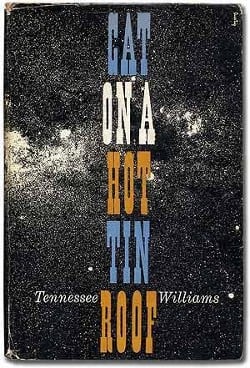Cat on a Hot Tin Roof YouTube Fireside Chat
Episode 26: Youtube Fireside Chat. Cat on a Hot Tin Roof
Craig and Lindsay are off to New York this week! And one of the plays that has just opened on Broadway is Cat On A Hot Tin Roof staring Scarlet Johansson. Lindsay and Craig discuss the play, and look at YouTube clips from various productions.
Show Notes
Wikipedia on Cat on a Hot Tin Roof
From the original Broadway Production
Paul Newman and Elizabeth Taylor Film
Natalie Wood and Robert Wagner
Jessica Lange and Tommy Lee Jones
https://www.youtube.com/watch?v=imGf6o-HIO0
Subscribe to The Theatrefolk Podcast
Episode Transcript
Lindsay: Welcome to TFP, The Theatrefolk Podcast. I’m Lindsay Price, resident playwright for Theatrefolk. Hello. I hope you’re well. Thanks for listening.
Today, it’s the first YouTube Fireside Chat of 2013, woop, woop! But first, let’s do some Theatrefolk news.
Okay, so last week in the Theatrefolk news, I talked about going to the Arkansas Thespian Festival, only I didn’t call it the Arkansas Thespian Festival. I called it the Ar-kan-sas Thespian Festival, and I’m sure that if you’re from Arkansas, hearing something called Ar-kan-sas is unsatisfying. So I just wanted to say that, yes, I do know it’s Arkansas, and I just get things flipped and turned around sometimes, and I apologize. So that’s news number one.
News number two is that we’ve got new plays, two new plays, so fresh from the printers they’ve still got new play smell to them. The first is a lovely sendup of Lord of the Flies by playwright Clint Snyder, who is a new-to-Theatrefolk playwright—love that—and it’s called Lord of the Pies. When Franny cannot open the door out of the pie shop, anarchy, the apocalypse, Scotch tape, and a talking lemon pie all converge in one great piece of pie, of course.
And then we have one of my plays, yay! I’m doing jazz hands for those of you who don’t have the visual part of a podcast, [laughs] which is everybody. And this is a new play of mine, it’s called Backspace. And in this play, for the characters, to write is to go to war, and ideas resist with every fiber of their being. It’s imagistic. It explores personification in a vivid theatrical manner – where else can you bring a typewriter to life? And it’s been through a really long journey to get to this point. And I have to say I’m pretty thrilled with its theatricality, and I know and I can say without a shadow of a doubt, it will be an awesome competition piece…of pie? Of course.
Lastly, where, oh where can you find this podcast? We post new episodes every Wednesday at Theatrefolk.com and on our Facebook page and on our Twitter page, and you can find us on the Stitcher app, and you can subscribe TFP on iTunes. All you have to do is search on the word “Theatrefolk.”
Hello, here we are. It is Craig. Craig, hello.
Craig: And Lindsay.
Lindsay: And me! And the weather outside is frightful, but the fire is oh so delightful. [Laughs]
Craig: For the YouTube Fireside Chat!
Lindsay: Woo-hoo! We’re cozied up in front of the computer with mugs of hot coco and a thick computer-generated fire. It’s the first YouTube Fireside Chat of 2013. This week, actually today, the day that this podcast is going to be posted, where are we going, Craig?
Craig: New York.
Lindsay: Yay! That’s right. So when we go see shows in the Big Apple, Craig, you can verify this, unless we’re…it’s something dead set on seeing, like Follies, we don’t have a plan. We don’t buy tickets in advance. We just go to the TKTS booth and see what’s playing, and wing it from there, right?
Craig: Yeah, that’s the fun of it, I think, because there’s so much to do and so much going on that it’s just fun to go and just pick something on a whim and go. It’s very spontaneous.
Lindsay: Uh-huh. So for this chat, I thought it would be fun to look at something, since we’re going, that is currently on Broadway that we may or may not see depending on…
Craig: Oh, yes it is. That’s right.
Lindsay: That’s right.
Craig: I know why you picked this.
Lindsay: Yay! See where I’m going? I can weave it together. It’s a fabric I know how to weave.
Craig: I thought you picked it because we recorded the podcast with a program called Audacity…
Lindsay: [Laughs]
Craig: …and then you picked Mendacity to record it, no?
Lindsay: [Laughs] You know, no. But I have to tell you, that is my favorite word of all time, and there is a play in the works where that is, in some form or fashion, going to be my title. I love the word mendacity. And I love the whole mendacity section in this play, and the play that I am talking about, which is Broadway right now with Scarlett Johansson in the role of Maggie the Cat, is Cat on a Hot Tin Roof.
So, we’re going to look at a couple of clips from various productions. I was just very jazzed to find a teeny tiny clip from the original production, there’s the Paul Newman/Elizabeth Taylor movie, and I also found on YouTube a Jessica Lange and Tommy Lee Jones version, and a Natalie Wood and Robert Wagner version. Now, we have seen Cat on a Hot Tin Roof at its full.
Craig: And we saw it a couple of years ago at the…
Lindsay: Shaw.
Craig: …Shaw Festival.
Lindsay: Yes, and Niagara-on-the-Lake. And my memory of it, I don’t have a lot of memories because we didn’t really enjoy the production, but my memory is that—and I had never seen it before. You had never seen it before either, right?
Craig: No, I don’t even think I’d read it before. I knew scenes…
Lindsay: Yeah.
Craig: …but again, you know there’s Big Daddy in it, but I didn’t really know the script.
Lindsay: Well, and there’s the stereotype too of, you know, Cat on a Hot Tin Roof and speaking in a Southern…and the whole Elizabeth Taylor…
Craig: The whole Tennessee Williams thing, yeah.
Lindsay: The Tennessee Williams thing. And my memory of it was that I was not enjoying the production at all, but my heavens, did I think it was a wonderful script. I just was blown away by the text.
Craig: I was quite shocked by the script. I mean, it explores themes that I was not aware would have ever been in the mainstream Broadway theatre of the fifties.
Lindsay: Yes. Well, the movie was 1958, so…
Craig: Yeah, so it must have been in the fifties, the play…
Lindsay: And, well, because it explores homosexuality, and they completely ripped that whole storyline out of the movie. So, you know, certainly was not in any way, shape or form mainstream.
Craig: Yeah, but I mean, certainly at the time there were a lot of homosexuals working on Broadway, but it wasn’t exactly gay-friendly yet.
Lindsay: No.
Craig: It was all hidden under the surface.
Lindsay: I think so, too.
Craig: Well, much like the homosexuality in Cat on a Hot Tin Roof is quite hidden under the surface. It’s never really said or spoken, but it’s pretty clear to me that that’s what’s going on.
Lindsay: I think it’s clear. I think it’s way clearer in the script.
Craig: Because I think even Williams kind of denied that that was going on in there.
Lindsay: Well, who knew?
Craig: Yeah.
Lindsay: In any case, so let’s start with…we have an original clip from the original production, which starred Barbara Bel Geddes as Maggie. My knowledge of her was that she was on Dallas. She was like the mother figure on Dallas. So to open up this clip and see her playing Maggie was shocking to me, and then in a good way. I loved it because it was only a minute, but it was very vivid. And she’s not pretty…
Craig: No.
Lindsay: First of all, she’s not trying to put on a Southern accent like to beat the band.
Craig: No, there’s not a lot of acting going on. When I watched it, it surprised me because when I was watching it I was thinking, wow, this is really kind of like a very fifties kind of style, like an old-time style that they were playing in. And the end of that clip punched me in the stomach, and I thought, “Wow, well, that’s the style that it’s written in, isn’t it?”
Lindsay: Right. Right, and that’s why it works at that time, because quite frankly, some of the other clips that we saw didn’t work at all.
Craig: This one did.
Lindsay: This one did.
Craig: This one just nailed me, and it was just for a short…I don’t even think that clip is a minute long.
Lindsay: I don’t think it is.
Craig: But when he says, you know…
Lindsay: “How are you going to have a kid with someone who can’t stand you?”
Craig: “Can’t stand you,” it just nailed me, and I thought it was fantastic.
Lindsay: I did too.
[Play excerpt plays]
So then, on the complete other end of the spectrum, there is a 1976 TV version with Natalie Wood and Robert Wagner.
Craig: Yes.
Lindsay: And this to me is…I’m not quite sure I’ve seen anything so awful, like Natalie Wood is… It’s like, “I’m pretending to be an…” She’s great. She’s a good actress. But it’s like, “I’m pretending. I am walking around and I am in this pretense and I am putting on my accent and I am just being very, very actory in the worst possible way.”
And I don’t think Robert Wagner opened his mouth. It was the clenched-jaw school of acting, which is not just him because Tommy Lee Jones, we also have a clip with Jessica Lange, and he went to the clenched-jaw school of acting.
[Play excerpt plays]
Craig: I could not get over how cheap that production looked. It had cheap TV movie of the week written all over it. Like it made the stuff that movies of the week on the Lifetime channel look professionally shot. Like the lighting was bad. The sound was bad. Everything looked like it had just been done in one take and whatever goes, goes. All the sound was just whatever life came off the mic, like I think she picked up some papers at one point and just killed all the sound because there was a paper rustling by her mic. It was just horrible. And the acting.
Lindsay: [Laughs]
Craig: The acting. There was no dramatic tension at all in that scene.
Lindsay: No.
Craig: Like they were in completely different scenes.
Lindsay: They were saying words. It was very much, particularly Natalie Wood, just talking, and there was not a lick of character behind it. Really, it quite flummoxed me and flabbergasted me.
Craig: Yeah, I thought, “Wow, if this was the only exposure you ever had to this script, you’d probably not think too much of it.”
Lindsay: Yeah. No, absolutely.
Craig: Not to take anything away from the writer, but it really shows how much the production means to the quality of the play as well.
Lindsay: Well, I think that, you know, I come from a pretty unique perspective that when I’m watching a play I’m looking for the… I separate production and text, you know, and I can do that.
Craig: Mm-hmm.
Lindsay: It’s kind of my job. I think the normal person going to see a play has no concept of that. They see everything as one.
Craig: Mm-hmm.
Lindsay: So, you know…
Craig: Well, as well they should because that’s what they’re seeing.
Lindsay: Oh, absolutely. And if they see a bad production, it’s all one, it’s all bad.
Craig: Mm-hmm.
Lindsay: Absolutely. Okay. So what did you think of the movie?
Craig: The movie.
Lindsay: And this was with Paul Newman as Brick, and Elizabeth Taylor…
Craig: As Maggie [00:12:03]
Lindsay: …as Maggie.
Craig: I quite liked it. Like I didn’t like as much as the Broadway production, but it was a movie, and I felt when I was watching it that, “Wow, I’m watching two amazing movie stars in their prime.”
Lindsay: Yeah.
Craig: Like I’m not sure it was probably the greatest production that ever could have happened, but it was probably the greatest movie that ever could have been made of this script. I mean, they were fantastic in it, I thought.
Lindsay: I agree. Just the little bit…because we’ve seen the movie… I think after we watched the show that we saw, we then went and sought out the movie and watched the movie, again, a couple of years ago. And just looking at it again, I thought that both Paul Newman and Elizabeth Taylor just lit up the screen.
Craig: Mm-hmm.
Lindsay: As is their job.
Craig: Yeah.
Lindsay: That’s what they’re supposed to do. And Paul Newman just was so great at doing very little, and I think that’s where both Robert Wagner and Tommy Lee Jones falter…
Craig: Mm-hmm.
Lindsay: …in that there’s so much going on and there’s so much pain that this character goes through, he’s a big ball of pain. And you know, Maggie is trying to batter…she’s a battering ram against him to try and get through, and he is very not making it happen. And I think they make the mistake of ‘inner pain means clenched jaw” and… [Laughs]
Craig: Yeah. It was a good example I think of less is more, too. They just drew the scene…they just brought the scene to them. They weren’t overacting. They were just performing the piece and bringing us into their world.
Lindsay: And there was a great moment when Brick raises his voice to Maggie and she just like, you could tell right away that like, “Ooh, that was a little bit of a tide turning.” And she just walks around and she goes and she locks the store…
Craig: Mm-hmm.
Lindsay: …and she locks the store, and she’s very calm…
Craig: And methodical.
Lindsay: …and methodical, and you got the sense, I got the sense that, you know, quite literally, the room is closing in on you and the room is closing in on Brick and…
Craig: Mm-hmm.
Lindsay: It was really lovely, and it’s a shame that the movie version couldn’t have fulfilled all of what the play has to offer.
Craig: Mm-hmm.
Lindsay: And that comes out of my mouth and I’m like, well, you know what? It’s not really supposed to. It’s two completely different forms.
Craig: Mm-hmm.
Lindsay: But just theme-wise.
[Play excerpt plays]
Craig: Now, one thing I’ll say, I did not like the choice of music that was used, but I liked how the music was used. The music that was playing, it sounded like a jazz trio that you’d hear in like the hotel of a fancy lobby that just didn’t jive with me for the location. But if you watch the scene, the music is playing and it’s this kind of, like I say, like soft cocktail party music. And then, as soon as they start arguing, like the fight ratchets up, the music stops.
Lindsay: Hmm.
Craig: And then the fight builds to a head and they stop, and the music kicks back in. It’s kind of a neat little…
Lindsay: Back and forth.
Craig: …back and forth that they used. I just didn’t like the choice.
[Play excerpt plays]
Lindsay: Yeah. And I think one last… [Laughs] Speaking of choices, in the Jessica Lange/Tommy Lee Jones, again, a very cheap TV version, and made me laugh and it shouldn’t have, but Jessica Lange was very…whoever decided that she was going to be very literal in her interpretation of Maggie as the cat…on more than one occasion basically got her claws out, and she scratches the furniture and she’s [00:16:57] at the screen window and she wags her hands down the window pane, and I’m like, you know, the first time she did it I just kind of went, “Oh, that’s a little neat choice.” And then, four times later I’m like, “I don’t need to be… She’s not a cat. She is a woman.” [Laughs]
Craig: Mm-hmm.
Lindsay: We don’t need to go down this path.
Craig: Well, and her and Tommy Lee Jones were acting in two completely different places.
Lindsay: Yeah.
Craig: She was doing like… I don’t know, she was doing some kind of Blanche DuBois thing, and he was trying to…
Lindsay: Yes!
Craig: He was trying to be like gritty or…
Lindsay: Yeah.
Craig: Yeah. They were not in the same scene.
Lindsay: Yeah.
Craig: I don’t know if they rehearsed or what.
Lindsay: No, I don’t know. Well, who knows?
[Play excerpt plays]
So I think that this is a play which is so easy to mess up, and I think that’s what the clips really showed me, is that it’s so easy to just sort of, you know, go into a stereotype. Maggie the Cat, well, let’s just play that Southern cat motif to the hilt, and that’s not what the character’s about at all, and all you have to do is go back and look at that Barbara Bel Geddes clip.
Craig: Mm-hmm.
Lindsay: If you don’t look at any of the clips, look at what she does. She’s not… You can tell, because that’s the whole point, is that Maggie is from the wrong side of the tracks and she is clawing onto this new life…
Craig: Mm-hmm.
Lindsay: …and to not have to ever go back. And I believed it. Just looking at her, I can tell that she’s not from the same world as the rest of them and will have to fight and claw. And I think that’s a so much stronger choice to play for a character.
Craig: Well, I love that you found that clip from the original production because since…like the plays from the fifties when the whole idea of method acting was really coming into play, you know.
Lindsay: Yeah.
Craig: And what we think of today, this deep, eternal wailing and gnashing that people used to channel their characters, you are clearly not seeing that in the one in the fifties. You weren’t seeing what we think of as method acting in the clip from the fifties…
Lindsay: Yeah.
Craig: …where they are doing method acting at its…
Lindsay: At its purest.
Craig: …at its purest…
Lindsay: Yeah.
Craig: …at its peak. And the clips from later on are people trying to do some kind of…
Lindsay: Yes!
Craig: …method acting, but they’re not really achieving what was achieved in the fifties. They’re doing something harder. They’re working harder. They’re trying harder.
Lindsay: And, coming across so much…it’s just fake. It just comes across as very fake. And you know what? I just read an article by David Hare, just talking about choosing to write for theatre as opposed to write for television and how he wished he could write for television but he’s too slow, and about how sometimes writers, playwrights, just don’t see the good that they do, and then he very specifically mentioned that Tennessee Williams didn’t see the amazing work that he had created by the end of his life.
Craig: Hmm.
Lindsay: Isn’t that a horrible shame?
Craig: Why, because he died? Is that…?
Lindsay: No, no. He just…well, at the end of his life, and reflecting on his work, and I’m paraphrasing, it was just a teeny tiny thing that he said, David Hare, that he didn’t…
Craig: He didn’t appreciate it?
Lindsay: …appreciate his own work.
Craig: Oh, okay.
Lindsay: Yeah.
Craig: Hmm. Interesting.
Lindsay: And horrible. [Laughs]
Craig: Yeah. That’s kind of sad.
Lindsay: It is.
Craig: That’s like this impact…
Lindsay: And on that note, we’re going to end! [Laughs] On that happy note. [Laughs]
Craig: Cue the music.
Lindsay: Cue the music. [Laughs] Yay! We sure know how to… Well, it’s this fabric that I know how to weave, apparently. [Laughs] Or not so well.
Craig: The music’s playing.
Lindsay: [Laughs]
Craig: Take care, my friends.
Lindsay: That’s it, that’s where we’re going to end. Take care, my friends. Take care.
Music credit: “Ave” by Alex (feat. Morusque) is licensed under a Creative Commons license.



